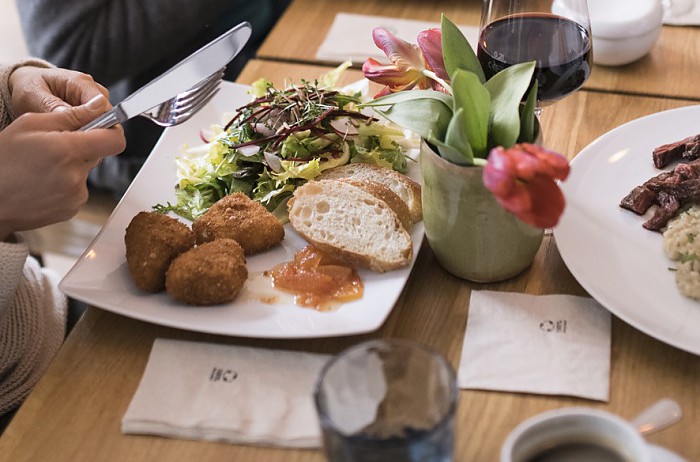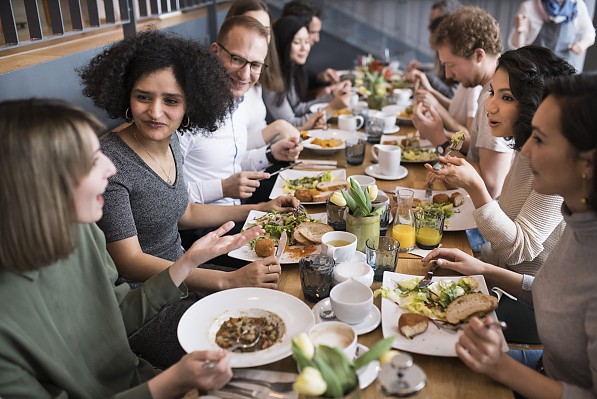

13. October 2023
5:00 – 9:00 pm
Costs:
60,- € per person
Registration via museum@sepulkralmuseum.de or 0561 918 93 15
One Missing.
Funeral Feast Yesterday And Today
A cooperation of the Museum for Sepulchral Culture and the Bio Restaurant Weissenstein
Matjes, honey bread, pickles or rather butter hole cake? What do we eat and drink when we are grieving? What makes saying goodbye to a loved one easier? What tastes provide comfort? The ideas of what should reach the taste buds of the mourners at the funeral feast, and how it is designed, are manifold. The Museum for Sepulchral Culture and the Restaurant Weissenstein are now taking up this topic. With "Eine*r fehlt – Leichenschmaus gestern und heute" (One Missing – Funeral Feast Yesterday And Today), a framework is to be created to talk about the connection between mourning and food and about the very personal view of the valuable ritual of funeral feasting. About the feeling when someone is missing and about what it takes then.
The event ties in with the museum's current special exhibition "Consolation – Tracing A Human Need, which illuminates the phenomenon of comfort from various cultural, religious and artistic perspectives and reflects on how we can confront experiences of loss and the pain associated with them - the sensory approach to the exhibition's theme is to become even more present in the new event format.
An evening in three courses
"A breakfast without honey bread would have been unthinkable for her" – Why should there not be exactly what the deceased liked to eat himself or herself as a farewell? The event "One Missing" begins in the special exhibition "Consolation". At the place where visitors can answer questions with blackboard chalk such as "Do you have rituals that comfort you?", "What food is served at your funeral service?" and "What music gives you comfort?" the guests take their seats at a large blackboard. Laced with cultural history and sociological impulses, this first course will be about engaging in conversation with one another.
"In rituals, we connect with our deceased again and again. Rituals keep these connections alive, and therein lies great potential for comfort," says museum director Dr. Dirk Pörschmann. Eating together also builds community. Every family member, friends and mourners gather. Through the process of taking nourishment, one connects and that gives comfort. "Food and drink are the essence of our aliveness. We cannot do without it. In the funeral feast we turn to life: a life without the real presence of the deceased, but with an intense spiritual, emotional or soul contact. In conversation with others, we share our memories about the dead. We internalize them."
The second walk is a walk in the truest sense of the word. Together, we walk to the nearby Weissenstein Restaurant. The companion is the question "What comforted you last?". In a one-on-one conversation, this question is to be explored.
The answers are the topic of the table talk in the third course. The guests take their seats at a large table in the Weissenstein organic restaurant. This is where the actual funeral feast now takes place. "I remember this ritual as being very meager, with coffee and dry cake," says Weissenstein co-founder and organic farmer Stefan Itter. "There is then clearly the communal act in the foreground. Funeral feast, however, can also be: We sit together at a festively set table and eat well."
According to the credo of the organic restaurant, there will be authentic, fresh and regional cuisine, with and without meat, prepared by chef craftsman René Müller. The meat will come from Stefan Itter's organic farm in Kirchberg, for whom death is part of everyday life. Here the circle closes: the Trost exhibition at the Museum for Sepulchral picks up the theme of funeral feasts; on his farm he raises animals with the knowledge that they will one day be eaten. "When you eat meat, an animal has died. That's different than when a human dies, but it's also about death and saying goodbye."

Arbeitsgemeinschaft Friedhof und Denkmal e.V.
Zentralinstitut für Sepulkralkultur
Museum für Sepulkralkultur
Weinbergstraße 25–27
D-34117 Kassel | Germany
Tel. +49 (0)561 918 93-0
info@sepulkralmuseum.de








